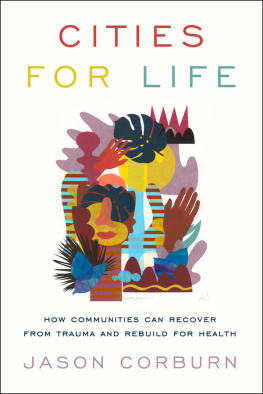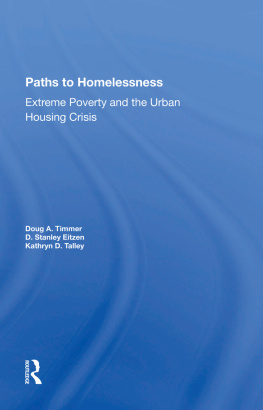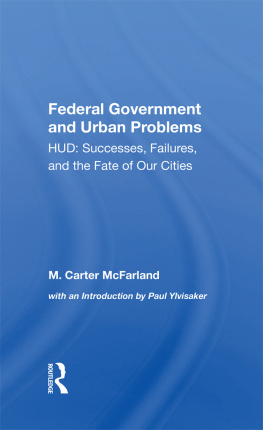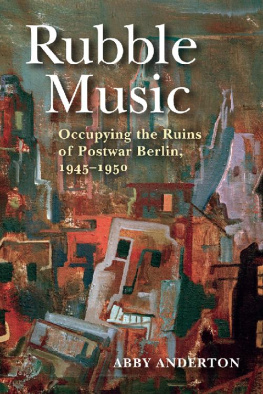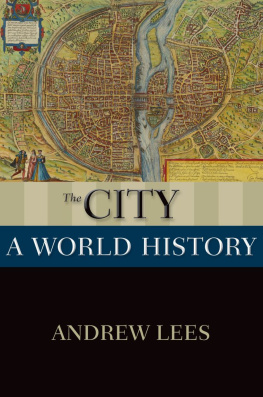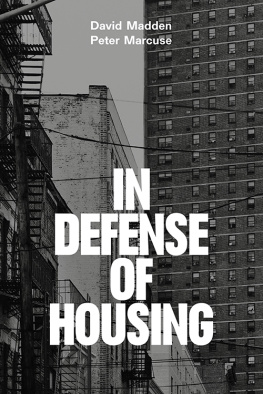In the Wake of War
IN THE WAKE OF WAR
The Reconstruction of German Cities after World War II
JEFFRY M. DIEFENDORF

Oxford University Press
Oxford New York Toronto
Delhi Bombay Calcutta Madras Karachi
Kuala Lumpur Singapore Hong Kong Tokyo
Nairobi Dar es Salaam Cape Town
Melbourne Auckland Madrid
and associated companies in
Berlin Ibadan
Copyright 1993 by Oxford University Press, Inc.
Published by Oxford University Press, Inc.,
200 Madison Avenue, New York, New York 10016
Oxford is a registered trademark of Oxford University Press
All rights reserved. No part of this publication may be reproduced,
stored in a retrieval system, or transmitted, in any form or by any means,
electronic, mechanical photocopying, recording, or otherwise,
without the prior permission of Oxford University Press.
Library of Congress Cataloging-in-Publication Data
Diefendorf, Jeffry M., 1945
In the wake of war: the reconstruction of German cities after
World War II / Jeffry M. Diefendorf.
p. cm. Includes bibliographical references and index.
ISBN 0-19-507219-7
1. Urban renewalGermanyHistory20th century.
2. City planningGermanyHistory20th century.
3. Reconstruction (19451951)Germany.
I. Title. HT178.G4D54 1993 307.76094309045dc20 9228145
2 4 6 8 9 7 5 3 1
Printed in the United States of America
on acid-free paper
For Barbara
Acknowledgments
This work, forged over many years, would not have been possible without strong financial support. I received fellowships or grants from the National Endowment for the Humanities, the National Science Foundation, the University of New Hampshire, the Hoover Institution at Stanford University, the Woodrow Wilson Center for International Scholars, and the Alexander von Humboldt Foundation. A travel grant from the German Academic Exchange Service (DAAD) made it possible to spend a summer collecting photographs in German archives. The generosity of these institutions has been greatly appreciated. I am also indebted to a great many Germans and Americans, more than I can acknowledge individually here, who provided valuable help and encouragement along the way. I offer my thanks to the many librarians and archivists in Germany and the United States who shared their expertise and advice. In particular I am grateful for the help rendered by my research assistants Dana Hollander (at the Wilson Center) and Rani Tudor (at New Hampshire). Friedrich-Wilhelm Henning, Hermann Wellenreuther, and Werner Durth kindly served as my sponsors and hosts during my stay in Germany as a Humboldt Fellow. Paul Mllejans and Klaus-Dieter Ebert, directors of the city building administrations in Aachen and Hamburg, went out of their way to provide access to materials not yet turned over to the public archives. My sincere thanks also to Niels Gutschow, Werner Durth, Karl Bttcher, and Hartmut Frank for sharing primary materials from their own collections and manuscripts of their work. The many scholars who commented on papers presented at different forums in Germany and the United States, and the anonymous readers of the manuscripts which subsequently appeared as journal articles helped clarify my thinking. While a fellow at the Woodrow Wilson Center, I benefitted greatly from the penetrating and stimulating comments on my work offered by other fellows and by those who participated in my colloquium there, including Dietrich Orlow, who was the main commentator. Diethelm Prove and Andrew Lees, who read this manuscript for Oxford, made useful suggestions for clarifying my arguments and helped me avoid some errors. Terri Winters of the University of New Hampshire assisted in preparing the graphs. I must also thank Elisabeth Nichols, who read the manuscript with great care, suggested many stylistic improvements, and pointed out problematic passages that required revisions.
Several architects and planners who had been active participants in postwar reconstruction were kind enough to grant me interviews. For this I wish to thank Karl Bttcher, Arthur Dhn, Hans von Hanffstengel, Rudolf Hillebrecht, Gunther Khne, Helmut Prost, Theodor Schler, and Hans Speck. Their observations sometimes provided answers to questions that still remained after my labors in the archives.
Luchterhand Literaturverlag of Hamburg kindly gave permission to quote two stanzas from Gnter Grasss poem Die groe Trmmerfrau spricht. Chapman and Hall of London granted permission to reprint parts of my article Reconstruction Law in Germany, which first appeared in Planning Perspectives in 1986. Similarly Central European History granted permission to reprint parts of Konstanty Gutschow and the Reconstruction of Hamburg, which appeared in 1985, and Sage Publications granted permission to reprint parts of Artery: Traffic Planning in Postwar Germany, which appeared in The Journal of Urban History in 1989. My thanks to all four of these publishers.
The following institutions generously granted permission to reproduce photographs: the Landesbildstelle Berlin; Bildstelle und Denkmalsarchiv, Nuremberg; Staatliche Landesbildstelle Hamburg; Landesbildstelle Wrttemberg; Presseamt der Landeshauptstadt Hannover; Verkehrsamt der Stadt Kln; Museum fr Kunst und Kulturgeschichte der Hansestadt Lbeck; Rheinisches Bildarchiv, Cologne; and the Freie und Hansestadt Hamburg, Baubehrde-Lichtbildnerei. Michael Brix (Munich) and Christian Dalchow (Cologne) each granted permission to reproduce a photograph. Materal from the Gropius papers is cited by permission of the Houghton Library of Harvard University. Several publishers granted permission to reproduce tabular material, including: the Architekten- und Ingenieur-Verein Hamburg, Bund Deutscher Architekten, and Bertlesmann Fachzeitschriften.
During my research in Germany, several friends offered me extended hospitality, which made long hours in archives and libraries much easier to bear. For this my thanks to Hildegard and Claus Caspers, Evami and Aad Boonstoppel, Hermann-Josef Rupieper, Jim Shedel and Marilu Woods, Hilde and Robert Silberberger, and Elisabeth and Gnther Marshall-Wagoner. Finally, as has been the case throughout my career, my thanks to two special persons, my aunt Elizabeth Rosenfield and my wife Barbara Diefendorf. With patience over the years they read pieces of the manuscriptsometimes several timesand offered well-considered, constructive criticism from which my thinking and my prose have always benefited.
Contents
,
,
Introduction
Writing a history of the rebuilding of Germanys cities after World War II has proven to be an intensely challenging and richly rewarding project. As my research progressed, new questions and material continually forced reconsideration of my research design and my hypotheses. Urban reconstruction is a complex and to many an emotionally charged subject replete with subtle intricacies and major implications for the conceptualization of the history of modern Germany. A sketch of the origins and evolution of this book will help explain its structure.
My interest in the subject began in the fall of 1977, when, as an academic expert on Germany, I accompanied a University of New Hampshire alumni tour that began in Munich. On the bus ride from the airport, these tourists, some of whom had visited Germany right after the war, posed demanding questions. How could I explain the apparent harmony of the street scenes and the smooth flow of traffic in Munich? When we reached the Marienplatz, Munichs main square, I was asked to explain the disharmony between the old (the town hall) and the new (a Kaufhof department store). And even as they asked questions, these tourists offered their own answers: Munich was rebuilt through the generosity of American Marshall Plan aid and under the influence of American architectural values.
Next page

